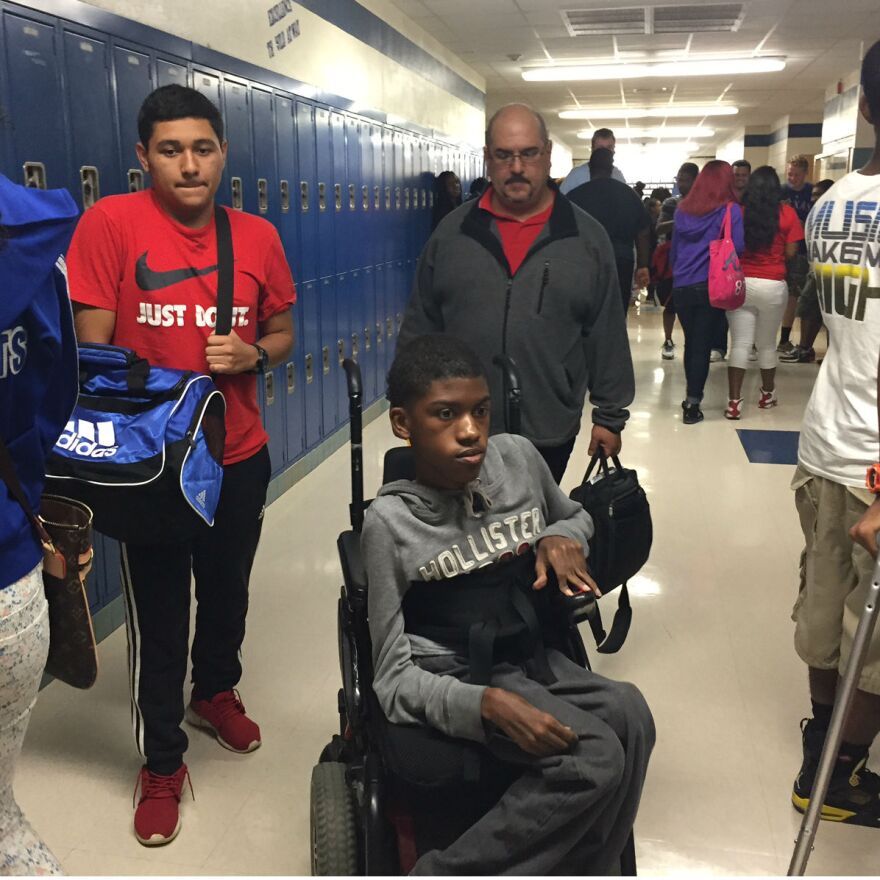For a kid with severe physical disabilities, having an aide at school can make a huge difference. It can affect whether a student stays in school or drops out, whether the student passes or fails. As part of KERA’s American Graduate initiative, Stella Chavez catches up with Class of ’17 student Chance Hawkins, a sophomore at Fort Worth’s Dunbar High School.
Chance wasn’t sure about having an aide assigned to him from the time school starts to the end of the day.
“I’m the type of person, like, I’m worried about what other people say,” Chance said. “So, like, other people, they be trying to ask me, is he like my daddy or something. And I say, ‘Nooo.’”
Some also wondered if aide Edgar Ortiz is doing the school work for him.
“But some people understand that, you know, that I can’t do it all by myself,” Chance said. “And high school is a fast pace. They don’t slow down.”
Ortiz helps Chance with everything from taking notes to adjustments in his wheel chair. Chance has Duchenne muscular dystrophy, which causes muscle weakness and deterioration. He tires easily. Ortiz also breaks down complicated subjects. It’s a job that requires a lot patience, something he learned with his younger brother, who lives with him now.
“He was diagnosed in the early 60s with a severe case of mental retardation,” Ortiz said. “That’s what they called it back then. As we were growing up, I kept asking my dad, ‘How come he can do this and he knows about that?’
Ortiz soon realized that disabilities don’t have to keep someone from a fulfilling life. The experience inspired him to study early childhood education at Texas Women’s University. He wanted to become a bilingual teacher, but someone told him schools need male special education teachers. So, he got certified in that.
“I like to think I have a heart for these kids,” Ortiz said. “It’s a job that I take very serious. You know, I kind of wish that when my brother was in school he might have this help or that help.”

Ortiz had been working with disabled kids at a middle school when the district called him. Chance needed one-on-one help through the end of the semester.
On a recent morning, Ortiz tries explaining the frequent changes in government after War World I.
“This is how I would look at it,” Ortiz explained. “Here’s a circle. Here is the group trying to lead and then you have all these different people with all these different ideas … ”
He says Chance can recall information, but sometimes, complicated material takes time to grasp. Motivation can be a challenge.
“One of the things that I know that these kids deal with – they’re looked upon already as different,” Ortiz said. “And, unfortunately, most people – their first reaction [is], ‘Oh he must crazy. He must not have anything up here.’ ”
At Dunbar, the teachers try to be flexible – they let Ortiz tweak the lessons. The strategy seems to be working. Chance got As and Bs on his latest report card – a first, he said.
History teacher Michael Epley has noticed a difference, too.
“The thing that was the problem before was he got easily distracted, especially by the kids around him, and [now] he’s getting his work done more,” Epley said. “I mean, he’s always been a smart kid, so it was more of getting the work done than the quality of the work that was being done. And it has really upped his grades because the aide keeps him focused.”
Donna Hunter, Chance’s 10th grade English teacher, said having Ortiz in the classroom has been helpful for other reasons, too.
“For one thing, because I don’t have to worry about Chance having any physical needs,” Hunter said. “If he’s uncomfortable in his chair’s position or whatever, Mr. Ortiz is right there with him all the time.”

The other day, when Ortiz stepped away, a boy stood up and walked toward Chance.
“I said, ‘What are you doing?’ He said, “I gotta fix Chance.’ And they’re used to watching out for him and taking care of him and I think that’s just very sweet.”
In helping Chance, aide Edgar Ortiz is teaching a lot of other lessons, too.






